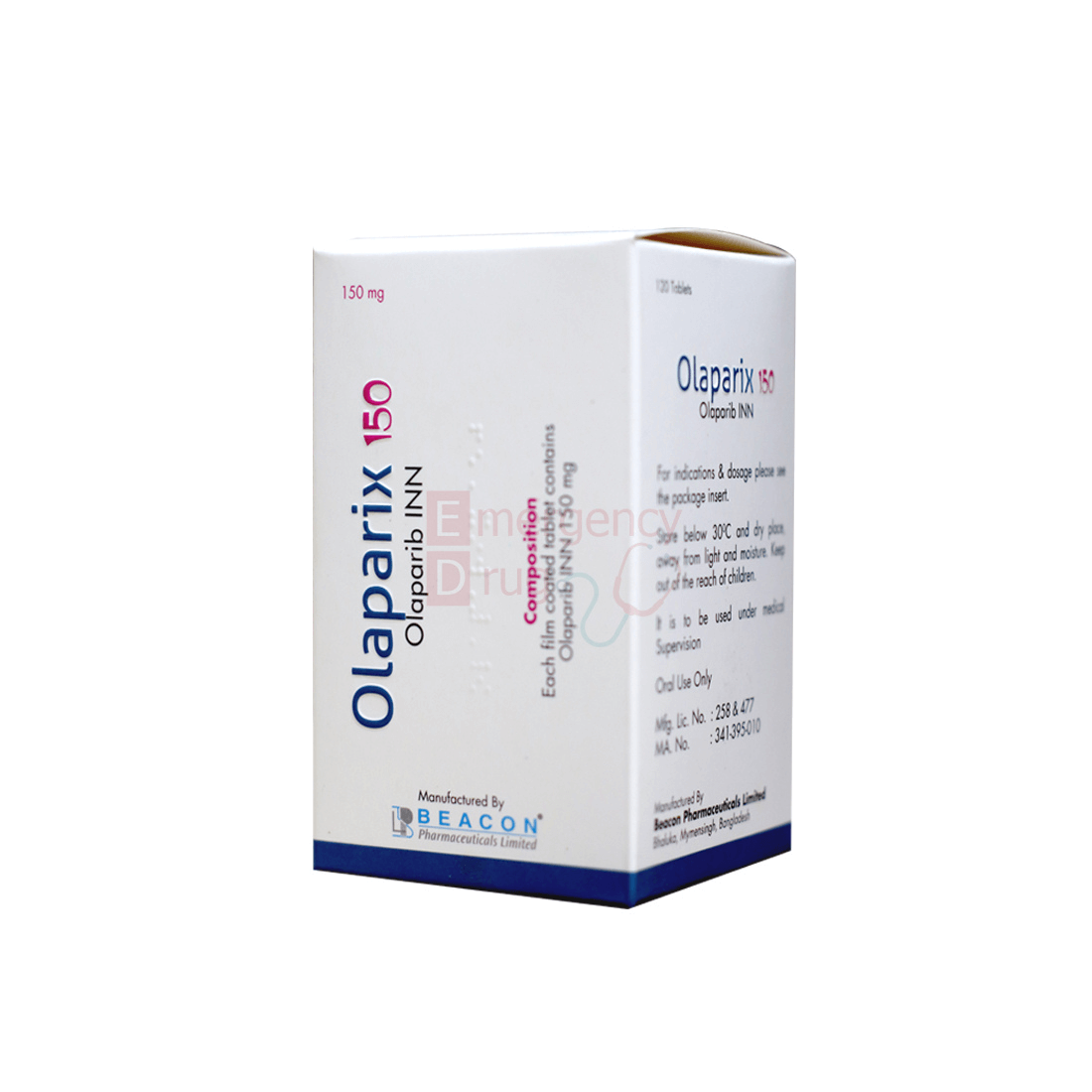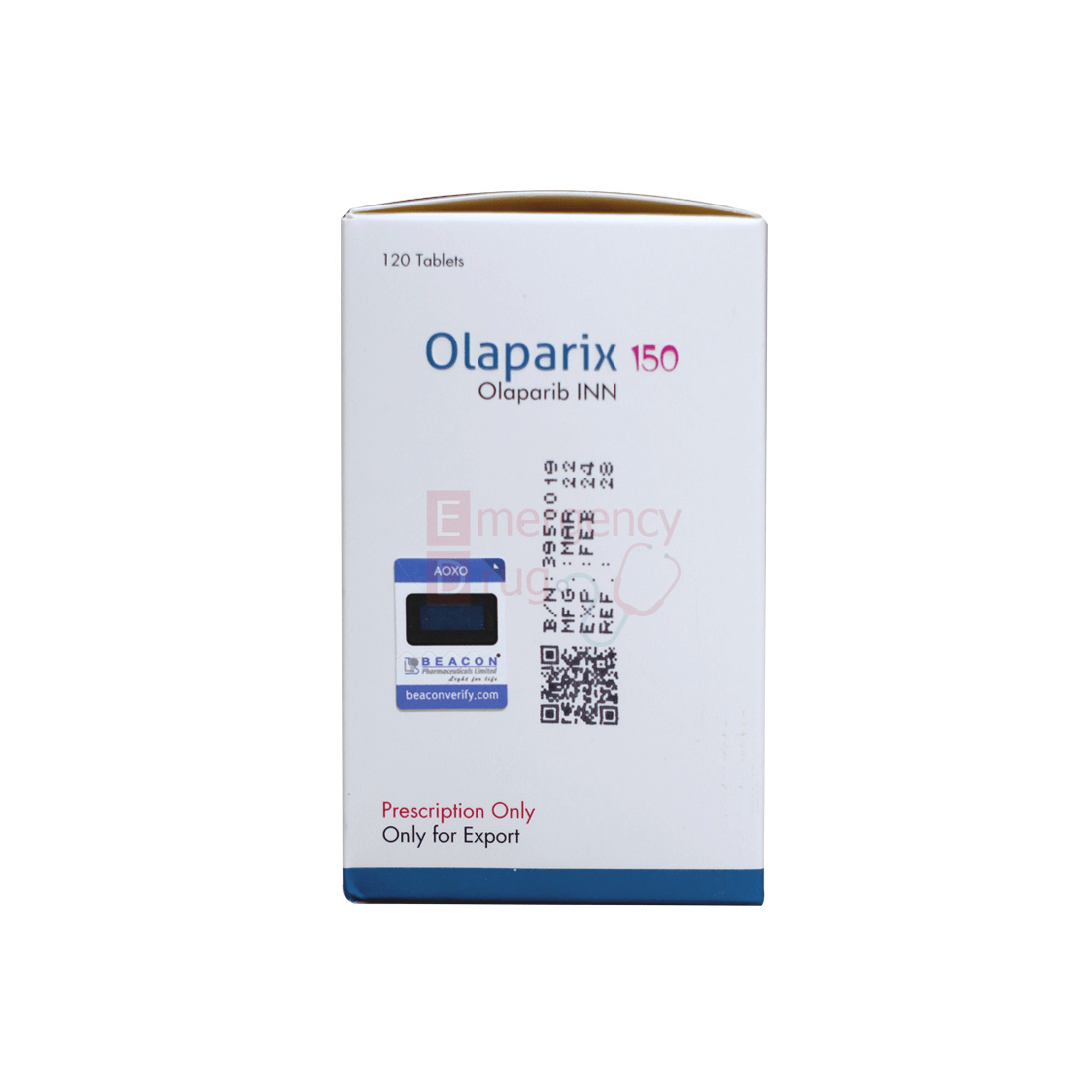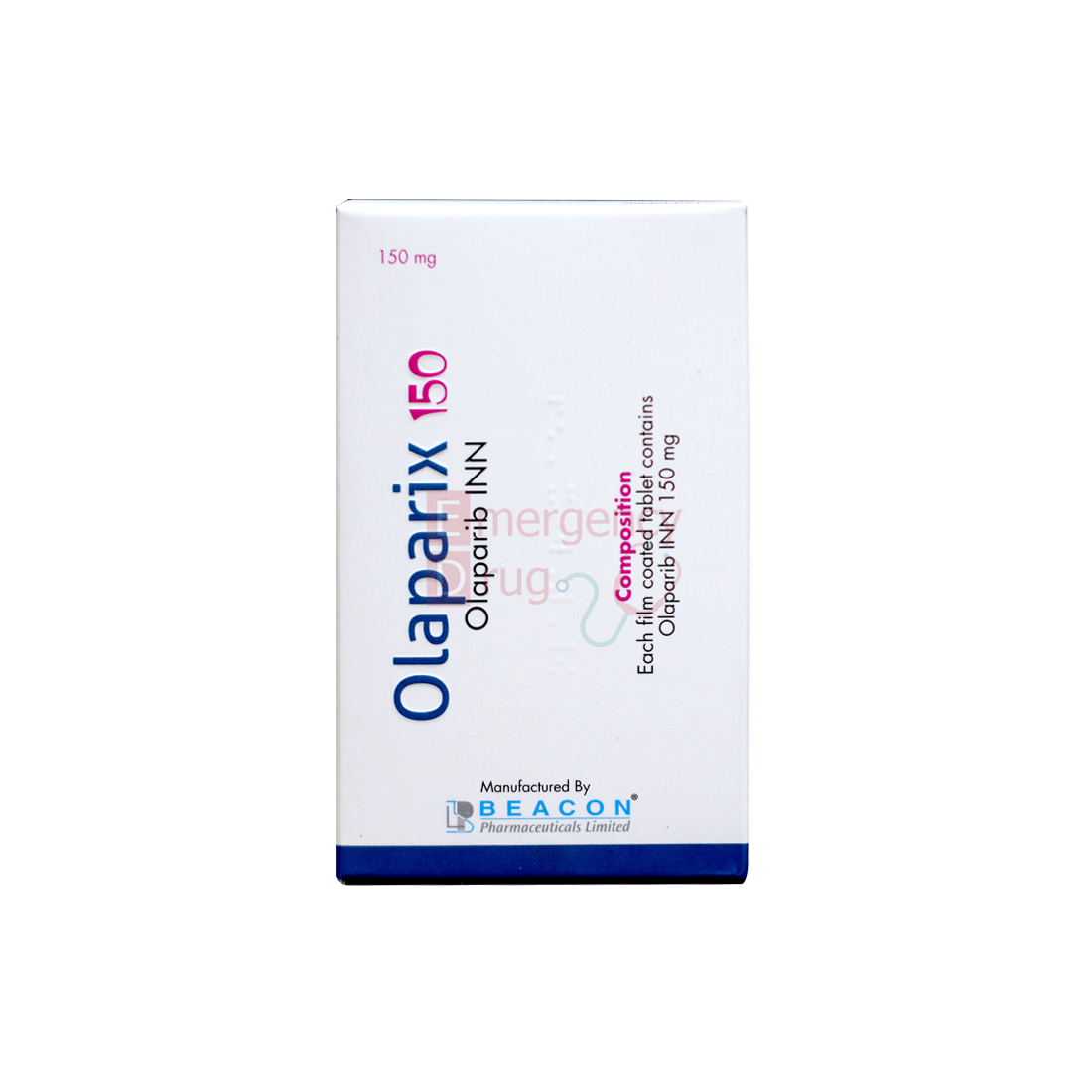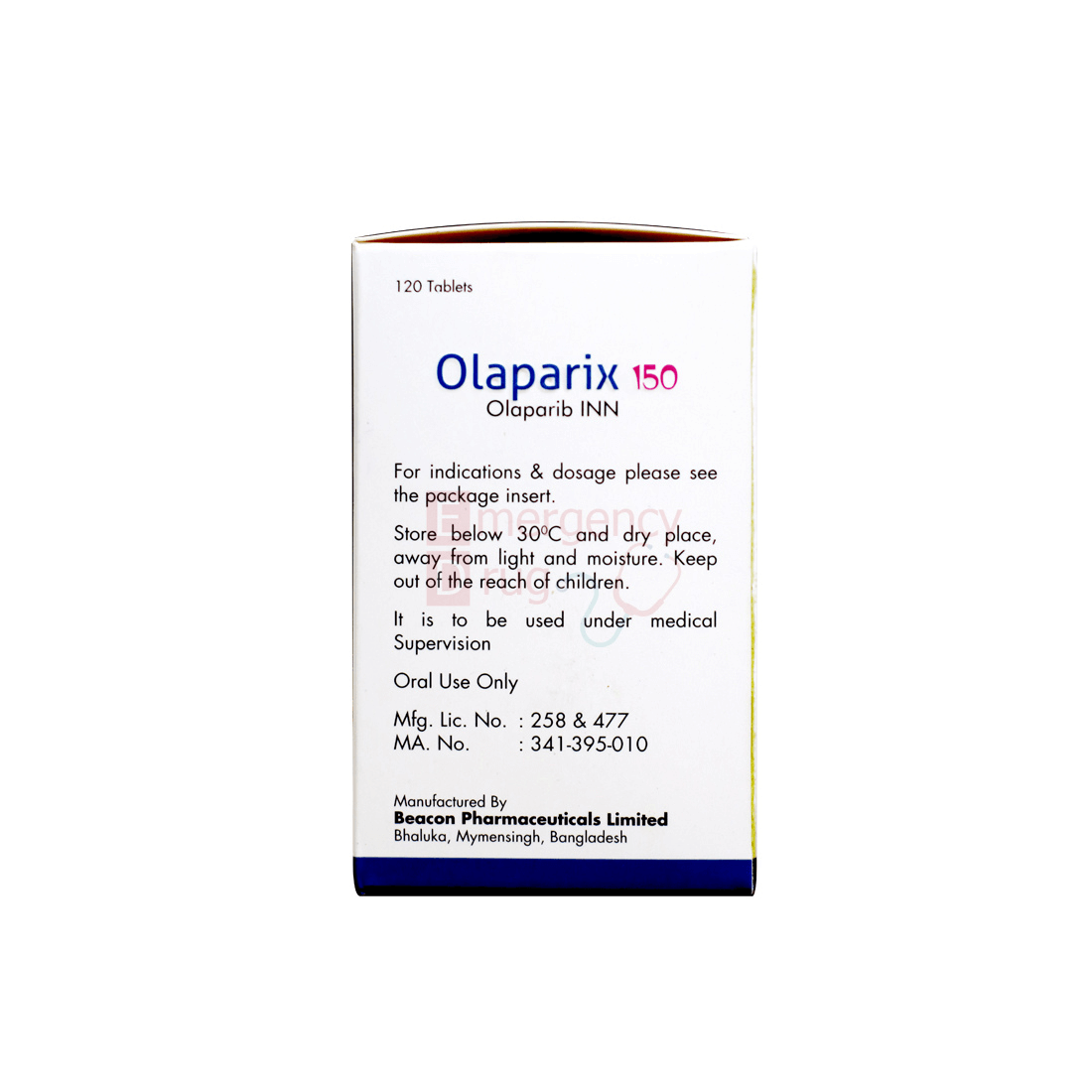Description
Olaparix (Olaparib) 150 mg is a medicine to take by mouth twice daily with or without food. Try to space your doses about 12 hours apart. Take Olaparix at around the same times every day. Follow the instruction on your prescription label carefully, and ask your doctor or pharmacist to explain any part if you do not understand. Take Olaparib exactly as instructed . Do not take more or less of it or take it more often than prescribed by your doctor.
Product Features:
| Product Name | : Olaparix |
| Generic Name | : Olaparib |
| Manufacturer | : Beacon Pharma Ltd |
| Indication | : Breast cancer |
| Formulation | : Tablet |
| Strength | : 150 mg |
| Quantity | : 120 Tablets |
| Storage | : Below 30°C |
| Registrations | : Export Only |
Indications
Breast Cancer:
Olaparix (Olaparib) indicate as monotherapy for the treatment of adult patients with deleterious or suspected deleterious germline BRCA-mutated (gBRCAm), human epidermal growth factor receptor 2 (HER2)-negative metastatic breast cancer who have previously been treated with chemotherapy in the neoadjuvant, adjuvant or metastatic setting. Patients with hormone receptor (HR)-positive breast cancer should have progressed on or be considered inappropriate for endocrine therapy. Germline BRCA mutation must be confirmed before Olaparib treatment is initiated.
Ovarian Cancer:
Olaparix (Olaparib) indicate as monotherapy for the maintenance treatment of adult patients with platinum sensitive relapsed (PSR) high-grade epithelial ovarian, fallopian tube or primary peritoneal cancer who are in response (complete response or partial response) to platinum based chemotherapy.
Pharmacology
Olaparib is an inhibitor of poly (ADP-ribose) polymerase (PARP) enzymes, including PARP1, PARP2, and PARP3. PARP enzymes involve in normal cellular homeostasis, such as DNA transcription, cell cycle regulation, and DNA repair. Olaparib has shown to inhibit growth of select tumor cell lines in vitro and decrease tumor growth in mouse xenograft models of human cancer both as monotherapy or following platinum-based chemotherapy. Increased cytotoxicity and anti-tumor activity following treatment with olaparib noted in cell lines and mouse tumor models with deficiencies in BRCA. In vitro studies have shown that Olaparib-induced cytotoxicity may involve inhibition of PARP enzymatic activity and increased formation of PARP-DNA complex, resulting in disruption of cellular homeostasis and cell death.
Dosage & Administration
There is a risk of medication errors between Olaparib tablets and Olaparib capsules. In order to minimize this risk, check the bottle labels to ensure that the drug being prepare and dispense is Olaparib tablets and not Olaparib capsules. Prescribers should specify the formulation and dosage of Olaparib on each prescription.
The recommended total daily dose of Olaparix (Olaparib) tablets is 600 mg, taken as two 150 mg tablets twice daily. The 100 mg tablet is available for dose reduction.
For treatment of ovarian cancer: Patients start treatment with Olaparib no later than 8 weeks after completion of their final dose of the platinum-containing regimen. Patients should have recovered from prior hematologic toxicities prior to starting Olaparib therapy (hemoglobin, platelet, and neutrophil levels should be ≤ CTCAE grade 1).
It recommend that Olaparib treatment continue until progression of the underlying disease or unacceptable toxicity. Olaparib should not given in combination with other anti cancer therapy. Grapefruit or other similar fruit juices that known to inhibit CYP3A should not consume while taking Olaparib.
Interaction
Clinical studies of Olaparib in combination with other anti-cancer agents, including DNA damaging agents, indicate a potentiation and prolongation of myelosuppressive toxicity. The recommended Olaparib monotherapy dose is not suitable for combination with myelosuppressive anti-cancer agents. Olaparib predominantly metabolize by CYP3A. Co-administered CYP3A inhibitors or inducers may respectively increase or decrease Olaparib plasma concentration.
Olaparix 150 MG Side Effects
The most common serious adverse reaction report was anemia (2.4% Olaparib vs 2.2% chemotherapy). The following serious ADRs report in one patient each: dermatitis allergic, neutrophil count decrease and platelet count decreased. The proportion of patients who permanently discontinue Olaparib due to adverse events was 4.9% in the Olaparib arm compare with 7.7% in the chemotherapy arm. Anemia and platelet count decrease were the only adverse reactions leading to discontinuation of Olaparib in more than one patient.
Pregnancy & Lactation
Pregnancy: Olaparib can cause fetal harm when administered to a pregnant woman base on its mechanism of action and findings in animals. Olaparib wasteratogenic and cause embryo-fetal toxicity in rats at exposures below those in patients receiving the recommended human dose of 400 mg twice daily. While this drug use during pregnancy, or if a patient becomes pregnant while taking this drug, apprise the patient of the potential hazard to the fetus and the potential risk for loss of the pregnancy.
Nursing Mothers: It is not known whether olaparib excrete in human milk. Because many drugs excrete in human milk and because of the potential for serious adverse reactions in nursing infants from olaparib, a decision should made whether to discontinue nursing or to discontinue the drug, taking into account the importance of the drug to the mother.
Use in Special Populations
Pediatric Use: The safety and efficacy of Olaparib not to established in pediatric patients.
Overdose Effects
There is no clear treatment in the event of Olaparib overdose, and symptoms of overdose not establish. In the event of an overdose, physicians should follow general supportive measures and should treat symptomatically.
Storage Conditions
Store in a dry place below 30°C, protect from light. Keep out of the reach of children.
Our Delivery Countries List:
United States, Canada, Mexico, Brazil, Argentina, United Kingdom, France, Germany, Italy, Spain, Portugal, Netherlands, Belgium, Switzerland, Austria, Sweden, Norway, Denmark, Finland, Iceland, Russia, China, Japan, South Korea, North Korea, Vietnam, Thailand, Malaysia, Singapore, Indonesia, Philippines, Australia, New Zealand, South Africa, Egypt, Nigeria, Kenya, Ethiopia, Morocco, Turkey, Saudi Arabia, United Arab Emirates, Iran, Iraq, Syria, Lebanon, Jordan, Qatar, Bahrain, Kuwait, Oman, Yemen, Afghanistan, Sri Lanka, Nepal, Bhutan, Maldives, Myanmar, Cambodia, Laos, Mongolia, Kazakhstan, Uzbekistan, Turkmenistan, Kyrgyzstan, Tajikistan, Azerbaijan, Armenia, Georgia, Ukraine, Belarus, Poland, Czech Republic, Slovakia, Hungary, Romania, Bulgaria, Greece, Albania, Serbia, Montenegro, Bosnia and Herzegovina, Croatia, Slovenia, North Macedonia, Kosovo, Malta, Cyprus, Tunisia, Algeria, Libya, Sudan, Sierra Leone, Liberia, Ivory Coast, Ghana, Uganda, Zambia, Malawi, Zimbabwe, Namibia, Angola, Somalia, Eritrea.














Reviews
There are no reviews yet.